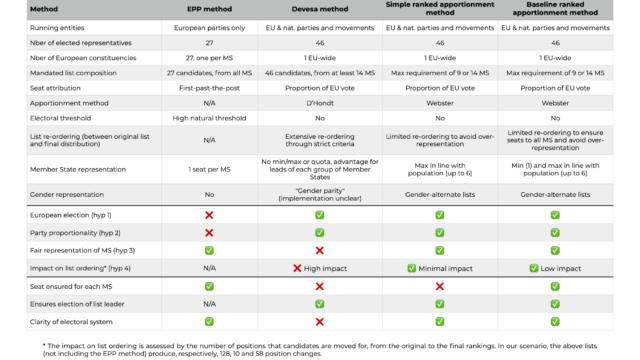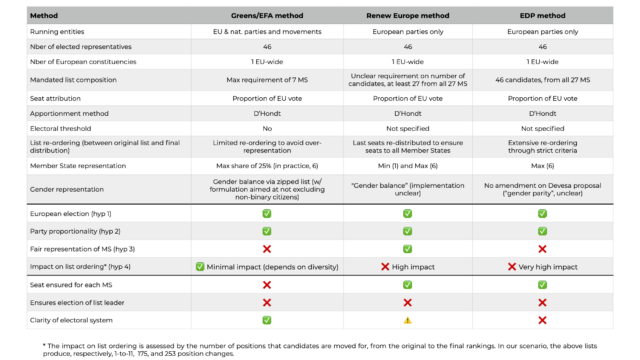European Democracy Consulting introduces the Ranked apportionment method, a simple and elegant voting method remedying all the shortcomings identified for the creation of a true European transnational constituency. Read the full report here and the proposed legislative amendments here.
As the European Parliament discusses the introduction of transnational lists ahead of the next European elections, and as several MEPs have presented their own proposals, European Democracy Consulting argues that the key to finding the optimal voting system is to focus on the goals and principles that led to the idea of transnational lists. This report therefore makes four fundamental hypotheses.
- Hypothesis 1: Transnational lists must be European by design
- Hypothesis 2: Party proportionality must be ensured
- Hypothesis 3: Member States must be fairly represented
- Hypothesis 4: The ordering of electoral lists must be preserved as far as possible
Additionally, for the purpose of testing the impact of the proposed methods in a real-life scenario, we assume the following practical hypotheses:
- Hypothesis 5: The composition of electoral lists will broadly follow the political groups of the European Parliament
- Hypothesis 6: Electoral lists are likely to be ordered by sizes of national delegations in the European Parliament
Based on these hypotheses, we analyse five proposals, respectively from the EPP, Rapporteur Domènec Devesa, the Greens/EFA group, Renew Europe, and the European Democratic Party.
We find that the EPP method fails hypotheses 1 and 2; the Devesa, Greens/EFA and EDP methods fail hypothesis 3; and the Devesa, Renew Europe, and EDP methods fail hypothesis 4.
In order to identify a compromise and remedy the identified shortcomings of these proposals, European Democracy Consulting has developed the Ranked apportionment method. By using the characteristics of apportionment methods and introducing a second, population-based apportionment, the Ranked apportionment method is a simple and elegant solution satisfying hypotheses 1 through 4.
The most elemental version, the Simple ranked apportionment method, satisfied all hypotheses and leaves lists almost untouched. While citizens of the smallest Member States are currently over-represented in the European Parliament due to degressive proportionality, the Baseline ranked apportionment method offers a solution to ensure the representation of all Member States, at the cost of only limited impact on lists’ ordering — far more respectful of parties’ preferences than the Devesa, Renew Europe, and EDP methods.
Finally, the report analyses a number of secondary factors for the design of a democratic, open and inclusive electoral system, including gender balance, list composition, and citizens engagement.
Overall, we are convinced that the Ranked apportionment method provides the best possible voting method and the fairest compromise for the introduction of a transnational constituency for the 2024 European elections. As a result, we call on the members of the AFCO committee to review this proposal, consider the overarching goals they seek to reach via the introduction of transnational lists, and adopt a voting method truly able to achieve these goals and strengthen our common European democracy.
Read the full report here and the proposed legislative amendments here.



